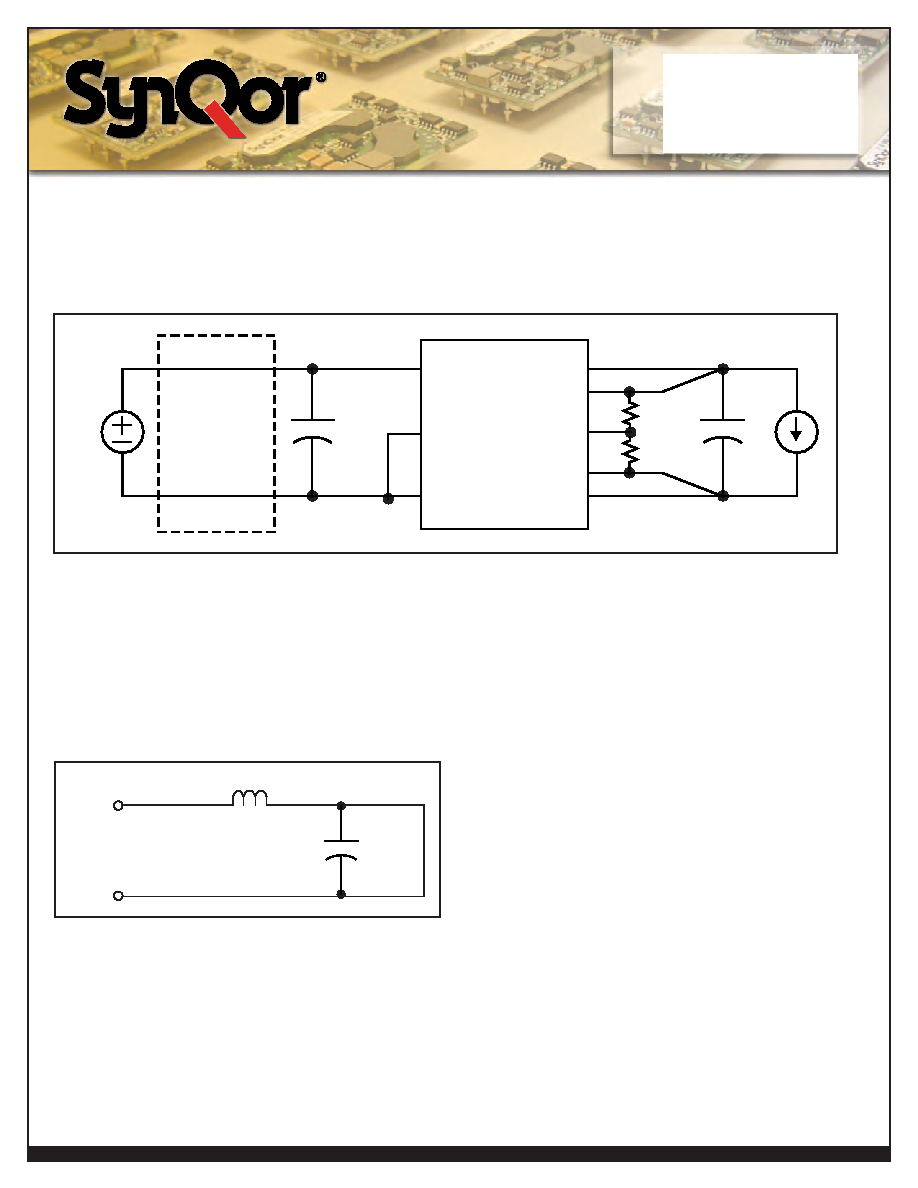- 您現(xiàn)在的位置:買賣IC網(wǎng) > PDF目錄69104 > PQ6025SMC20PYS-G (SYNQOR INC) 1-OUTPUT 50.5 W DC-DC REG PWR SUPPLY MODULE PDF資料下載
參數(shù)資料
| 型號: | PQ6025SMC20PYS-G |
| 廠商: | SYNQOR INC |
| 元件分類: | 電源模塊 |
| 英文描述: | 1-OUTPUT 50.5 W DC-DC REG PWR SUPPLY MODULE |
| 封裝: | ROHS COMPLIANT, SIXTEENTH BRICK PACKAGE-8 |
| 文件頁數(shù): | 5/15頁 |
| 文件大小: | 831K |
| 代理商: | PQ6025SMC20PYS-G |

Technical
Specification
PQ60025SMx20
Product # PQ60025SMx20
Phone 1-888-567-9596
www.synqor.com
Doc.# 005-0005218 Rev. A
06/18/09
Page 13
Vin
External
Input
Filter
Trim
Vin(+)
I
load
C
load
Vout(+)
R
trim-up
or
R
trim-down
Vsense(+)
ON/OFF
Vin(_)
Vout(_)
Vsense(_)
Electrolytic
Capacitor
APPLICATION CONSIDERATIONS
Input System Instability: This condition can occur because
any dc-dc converter appears incrementally as a negative
resistance load. A detailed application note titled “Input
System Instability” is available on the SynQor website which
provides an understanding of why this instability arises, and
shows the preferred solution for correcting it.
Application Circuits: Figure D provides a typical circuit
diagram which details the input filtering and voltage trimming.
Figure D: Typical application circuit (negative logic unit, permanently enabled).
Figure E: Internal Input Filter Diagram (component values
listed on the specifications page).
Input Filtering and External Capacitance: Figure E provides
a diagram showing the internal input filter components. This
filter dramatically reduces input terminal ripple current, which
otherwise could exceed the rating of an external electrolytic
input capacitor. The recommended external input capacitance
is specified in the Input Characteristics section on the Electrical
Characteristics page. More detailed information is available in
the application note titled “EMI Characteristics” on the SynQor
website.
Startup Inhibit Period: The Startup Inhibit Period ensures that
the converter will remain off for approximately 200 ms when it is
shut down for any reason. When an output short is present, this
generates a 5 Hz “hiccup mode,” which prevents the converter
from overheating. In all, there are seven ways that the converter
can be shut down, initiating a Startup Inhibit Period:
Input Under-Voltage Lockout
Output Over-Voltage Protection
Over Temperature Shutdown
Current Limit
Short Circuit Protection
Turned off by the ON/OFF input
L
Vin(+)
Vin(_)
C
相關(guān)PDF資料 |
PDF描述 |
|---|---|
| PQ6025SMC20PNS-G | 1-OUTPUT 50.5 W DC-DC REG PWR SUPPLY MODULE |
| PQ6025SMC20NRS-G | 1-OUTPUT 50.5 W DC-DC REG PWR SUPPLY MODULE |
| PQ6025SMC20NYS-G | 1-OUTPUT 50.5 W DC-DC REG PWR SUPPLY MODULE |
| PQ6025SML20NKS-G | 1-OUTPUT 50.5 W DC-DC REG PWR SUPPLY MODULE |
| PQ6025SML20PKS-G | 1-OUTPUT 50.5 W DC-DC REG PWR SUPPLY MODULE |
相關(guān)代理商/技術(shù)參數(shù) |
參數(shù)描述 |
|---|---|
| PQ60260HTB10 | 制造商:SYNQOR 制造商全稱:SYNQOR 功能描述:Half-brick DC/DC Converter |
| PQ60260HTB10NKF | 制造商:SYNQOR 制造商全稱:SYNQOR 功能描述:Half-brick DC/DC Converter |
| PQ60260HTB10NKS | 制造商:SYNQOR 制造商全稱:SYNQOR 功能描述:Half-brick DC/DC Converter |
| PQ60260HTB10NNF | 制造商:SYNQOR 制造商全稱:SYNQOR 功能描述:Half-brick DC/DC Converter |
| PQ60260HTB10NNS | 制造商:SYNQOR 制造商全稱:SYNQOR 功能描述:Half-brick DC/DC Converter |
發(fā)布緊急采購,3分鐘左右您將得到回復(fù)。